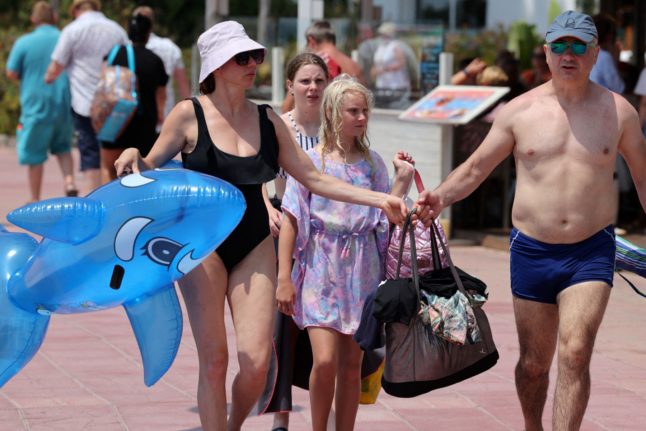It’s been almost five months since UK driving licence holders residing in Spain were told they could no longer drive on Spanish roads.
Since that fateful May 1st, an unnamed number of the approximately 400,000 UK nationals who are residents in Spain, as well as hundreds if not thousands of Spaniards and foreign nationals who passed their driving test in the UK, have not been able to use their vehicles in Spain or even rent one.
What adds insult to injury is that British tourists visiting Spain can rent a car without any issue. The fact that Spanish licence holders living in the UK can also continue to exchange their permits in the UK 21 months after Brexit came into force is equally hard to swallow.
READ MORE: ‘An avoidable nightmare’ – How UK licence holders in Spain are affected by driving debacle
The latest update from UK Ambassador to Spain Hugh Elliott on September 27th has done little to quell the anger and sense of helplessness felt by those caught in this bureaucratic rabbit hole.
“I wanted to talk to you personally about the driving licences negotiations, which I know are continuing to have a serious impact on many of you,” Elliott began by saying.
“As the government’s representative in Spain, I hear and understand your frustrations. I too am frustrated by the pace.
“We previously thought, we genuinely thought, that we’d have concluded negotiations by the summer.
“Many of you have quite rightly mentioned that I expressed the hope to you that we’d have you back on the road by the end of July.
“Now the truth is it has taken much longer, as there have been unforeseen issues that we have been working very hard to resolve.
“And I’m as disappointed as you are by the length of time that this is actually taking.
“But, please, be assured that we are resolving those issues, one by one. There are only a couple of issues left, but they are complex.”
It has previously been suggested by the UK Embassy that Spain has asked for data provision to form part of the exchange agreement, and that British authorities were reluctant to share said information on British drivers’ records, including possible infractions.
Whether this is still one of the causes of the holdups is unknown, given how opaque the Embassy is being in this regard.
“We’re working on this every day, it remains a priority,” the UK Ambassador continued.
“There is a lot going on behind the scenes, even if it doesn’t feel like it to you.
“I know too that you want a timescale and you want an update after every meeting.
“But I’m afraid I just can’t give you those things in this negotiation.”
The ambassador’s words are unlikely to appease those who are still unable to drive.
A few weeks ago, a Facebook group called “Invasion of the British embassy in Madrid for the DL exchange issue” was set up, which so far has more than 400 members.
The group’s administrator, Pascal Siegmund, is looking to set up a meeting with the British Embassy and Spanish authorities to shed light on the impact that not being allowed to drive is having on the life of thousands of UK licence holders in Spain.
Many of those affected are sharing their stories online, explaining how, due to administrative errors on the part of Spain’s DGT traffic authority, they were unable to process their licence exchange before the deadline.
This contrasts with the little sympathy shown by UK licence holders who were able to exchange and other commentators, who accuse those in limbo of not having bothered to complete the process, arguing that it’s essentially their own fault.
READ ALSO: Not all Brits in Spain who didn’t exchange UK driving licences are at fault
“Many of you also continue to ask why you can’t drive while the talks are continuing,” Elliott remarked.
“It is not in the gift of the UK government to reinstate the measures which previously allowed you to continue to drive whilst the negotiations were ongoing earlier in the year.
“As we said previously, we did request the reinstatement of those measures several times, but this wasn’t granted.”
It’s worth noting that since the news broke on May 1st that UK licence holders residing in Spain for more than six months could no longer drive, no Spanish news outlet has covered the story again.
Pressure from citizen groups such as the one recently set up and increased awareness about the issue in English-language news sites such as The Local Spain is perhaps the best chance in-limbo drivers have of their voices being heard and the driving licence debacle being finally fixed.
“I’d say we’re genuinely still making progress,” UK Ambassador Elliott concluded, practically the same message as in previous updates.
“I get how frustrating it is to hear that, but we are making progress. We’re in discussions almost daily about outstanding issues.
“And I remain very optimistic that we will reach an agreement and hope it will be soon.
“But as I say, I can’t give you a definitive timetable.
“And so, the advice that we have been giving all along, which is that you should consider taking the Spanish test if you do need to drive urgently, remains valid. Though we appreciate that’s hard.”



 Please whitelist us to continue reading.
Please whitelist us to continue reading.
Member comments